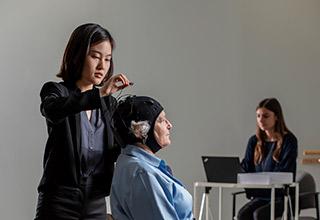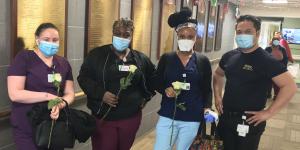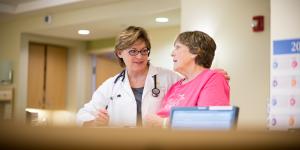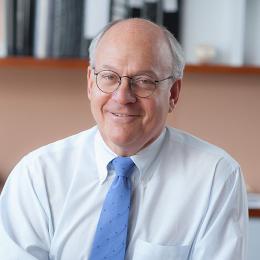Innovation in Senior Care During COVID-19
What we’ve learned and the impact on senior care for generations to come.
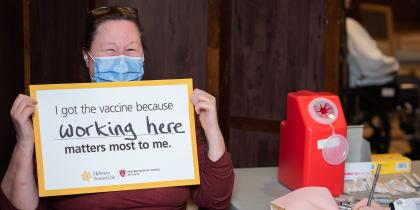
The COVID-19 crisis forced our health care system to innovate more rapidly and dramatically than ever before. At Hebrew SeniorLife, it’s in our DNA to constantly look at how we can improve our care for seniors, and to share what we learn with others. I am so very proud of how our staff took that commitment to a whole new level this year, in ways that will have a dramatic and lasting impact – for the better.
As we reflect on the one-year anniversary of when our world turned upside down, I’d like to share some of the ways we innovated our work to have an impact on the seniors we serve, along with other people of all ages who are benefiting.
Infection Control Best Practices
In April 2020, Massachusetts nursing homes became a hotspot for COVID-19 infections. In response, Governor Charlie Baker allocated $130 million in additional nursing home funding for two months. The state asked Hebrew SeniorLife, in partnership with the Massachusetts Senior Care Association, to lead a task force that both established a new set of criteria with which nursing homes were required to comply in order to receive the additional funding, and provided comprehensive assistance to help those nursing homes meet that higher bar.
A team of experts at Hebrew SeniorLife and our Hinda and Arthur Marcus Institute for Aging Research worked with the state to create a 28-point infection control checklist, and then teamed with Mass Senior Care to provide extensive technical support and education to over 300 nursing homes across the state to help them implement the requirements.
A paper published in September 2020 in the Journal of the American Geriatrics Society showed that adherence to these infection control processes was significantly associated with declines in weekly infection and mortality rates. In particular, appropriate use of personal protective equipment and grouping together patients who had the virus separately from those who didn’t were cited as especially effective in reducing the spread of COVID-19.
This successful state-wide effort was used as a model for a similar national program to support nursing homes in improving care for seniors, which Hebrew SeniorLife and Mass Senior Care continue to lead in our state. The lessons learned during this pandemic will inform nursing home care for decades to come, leading to better outcomes for seniors.
Pooled Testing Pilot Program
While nursing homes and assisted living facilities gained access to adequate testing supplies after an initial shortage last spring, independent senior living communities weren’t eligible for the same state and federal programs to test residents. This is despite the fact that these residents were also at very high risk for complications from COVID-19 due to their age and often, multiple comorbidities. At Hebrew SeniorLife we knew that keeping residents isolated in their apartments wasn’t the ideal answer – while it would reduce their risk of infection, it would also increase the risk of other negative health outcomes that come with a lack of physical and social activity.
To address this gap, Hebrew SeniorLife partnered with a number of labs, researchers, and academic institutions on community-wide testing efforts, including a weekly pooled testing program at our five senior living communities. The effort was supported by Combined Jewish Philanthropies.
The goal was to prove that when incidence is on the relatively low side, pooled testing would produce faster, accurate, and more affordable test results compared to individual testing. If the result of a pooled sample comes back negative, everyone in the batch is considered negative. If positive, everyone in that sample is retested to determine who is infected.
Beyond what the pooled testing program did to help our residents socialize and participate in activities more safely, it was also used as a model for Massachusetts’ surveillance testing program for schools, allowing them to bring students safely back for in-person learning.
The pilot program “helped change thinking at the state level that will allow millions of people, both in terms of public health and being able to resume safer economic activities sooner,” said Simon Johnson, professor of Entrepreneurship at MIT, and also head of the Global Economics and Management group. “It’s a remarkable achievement in the face of the greatest adversity faced in modern times.”
Training for Nursing Assistants
Last spring, COVID-19 precautions led to the closure of several Boston-area training programs for certified nursing assistants. This couldn’t have come at a worse time, as the nation’s workforce shortage only grew wider when COVID-19 increased the need for CNA positions at nursing homes.
In early 2020 – even before COVID-19 hit – it was already reported that the vacancy rate for CNA positions in Massachusetts nursing homes increased from 6 percent to 17 percent over the previous decade. This shortage was heightened by the need for more staffing and accelerated departures from the workforce, both caused by the pandemic.
In response, Hebrew SeniorLife created a new CNA training program which launched this month. The four-week, full-time, and fully-paid program includes in-person lectures, in-lab skills, and on-floor clinical experience. Trainees who successfully complete the program are guaranteed a CNA position at Hebrew Rehabilitation Center and will be certified by the American Red Cross.
This program is revolutionary for a number of reasons: First, it helps build a pipeline of qualified CNAs to address the workforce shortage. It also provides an entry-level career ladder for those seeking to have an impact in health care. In our experience providing career development programs for Hebrew SeniorLife employees, many CNAs go on to more senior roles including LPNs, RNs, and more. This provides a rewarding and viable pathway for a population that may have difficulty accessing other educational programs due to financial, socioeconomic, and other factors.
Research Related to COVID-19
Researchers at our Harvard Medical School-affiliated Marcus Institute quickly pivoted to study the impacts of COVID-19, clinical symptoms and risk factors for older adults, and treatments for the virus.
For example, Dr. Sharon Inouye is applying her expertise in the study of delirium to research how the condition can signal the presence of COVID-19. She also co-authored a letter published in JAMA Internal Medicine expressing concern about older adults being excluded from clinical trials for COVID-19 treatments and vaccines.
Dr. Alvaro Pascual-Leone has been studying the impacts of social isolation on seniors with memory challenges and developed tools and resources for caregivers struggling to care for loved ones with dementia during the pandemic.
In addition, Dr. Susan Mitchell partnered with the palliative care team at Hebrew Rehabilitation Center to create an Advance Care Planning SWAT Team that identified patients whose advanced directives did not include a do-not-hospitalize order, then worked with patients and their families to make sure their directives reflected their most recent goals of care. During the pandemic, we were able to treat most COVID-19-postive long-term chronic care patients without transferring them to an acute care hospital, which is less detrimental and disorienting for older people and helped ease the burden on an overrun hospital system.
A Transparent and Collaborative Approach
From the very beginning, Hebrew SeniorLife has taken a transparent and collaborative approach to dealing with this pandemic. I believe the best way to partner with our employees, patients, residents, families, and broader community is to tell them what we do and don’t know, and to be forthcoming about COVID-19 cases we had in our own communities and what we were doing to prevent or stop transmission.
Part of this commitment involves being available for numerous TV, print, and radio interviews to share what was going on in our communities and promote a public health message. In the early days I liked to say, “Make believe there’s a rattlesnake hiding in the bushes outside your door” when thinking about what activities were important enough to go out for. These days, I’m happy that while the rattlesnake isn’t completely gone, it’s making what is hopefully a final retreat thanks to the preventive measures we’ve all been taking and the increasing availability of vaccines.
Our commitment to transparency extends to the many ways we’ve partnered with health care providers, hospitals, community organizations, government officials, and so many others on a collective response to protecting vulnerable seniors during COVID-19. A once-in-a-generation, monumental challenge like this pandemic requires nothing less than a complete willingness to work together to achieve shared goals by ensuring those we all serve are receiving the right care in the right place at the right time.
For example, in the very early days of the pandemic we built a resource page on our website to freely share our best practices with other senior care organizations. More recently, we partnered with the town of Canton to host a vaccine clinic at Orchard Cove for Canton residents age 75 and older. And a number of us HSL leaders have proudly represented Hebrew SeniorLife and the senior care industry on several state work groups regarding optimizing care and safety during the pandemic, workforce shortages, and now re-opening strategies and timing.
The author Victor Hugo wrote, “even the darkest night will end and the sun will rise.” The last year brought a darkness that none of us could imagine, but I believe the sun is slowly but surely rising. And as we enter a new day and begin to imagine what life looks like after COVID-19, I am proud to stand with my colleagues at Hebrew SeniorLife, using these lessons learned to build a better, stronger senior care system – now and for future generations.
Blog Topics
Learn More
Innovation at HSL
Whether we're making discoveries or developing new teaching methods, HSL continuously works to improve the lives of older adults.
